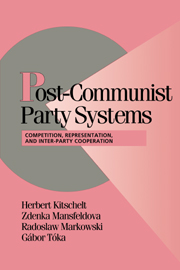Book contents
- Frontmatter
- Contents
- List of Figures and Tables
- Acknowledgments
- Introduction: Democracy and Party Competition
- Part I Theory: Party Systems and the Procedural Quality of Post-Communist Democracy
- Part II Setting and Research Strategy
- Part III The Structuring of Party Competition
- Part IV Political Alignments and Dimensions of Competition
- Part V Political Representation and the Quality of Democratic Governance
- Conclusion
- Appendix I List of Political Parties and Electoral Alliances
- Appendix II Questionnaire for the Elite Study
- Appendix III Population Survey Questions (Policy Opinions)
- Bibliography
- Index
- More Titles in the series
Appendix II - Questionnaire for the Elite Study
Published online by Cambridge University Press: 05 June 2012
- Frontmatter
- Contents
- List of Figures and Tables
- Acknowledgments
- Introduction: Democracy and Party Competition
- Part I Theory: Party Systems and the Procedural Quality of Post-Communist Democracy
- Part II Setting and Research Strategy
- Part III The Structuring of Party Competition
- Part IV Political Alignments and Dimensions of Competition
- Part V Political Representation and the Quality of Democratic Governance
- Conclusion
- Appendix I List of Political Parties and Electoral Alliances
- Appendix II Questionnaire for the Elite Study
- Appendix III Population Survey Questions (Policy Opinions)
- Bibliography
- Index
- More Titles in the series
Summary
We provide here the Polish version of the questionnaire on the basic questions covered in all four national surveys. The Czech and Hungarian versions differ in slight nuances on the core questions and have additional questions listed below. The Bulgarian questionnaire does not have questions 6 and 8, but substitutes questions on the use of Turkish language in Bulgarian school instruction, the defense of the Orthodox Church against proselytizing religions, and foreign relations with Turkey.
The format of the questions and the response options given to the interviewees is identical in all four surveys.
QUESTIONNAIRE: POLISH POLITICIANS
Ret resentatives of all relevant Polish parties have been asked to respond to this questionnaire. In a similar vein, a panel of Polish political scientists has been assembled to provide their expert judgments on the parties' voter appeals and organizational development. The identity of the respondents to this questionnaire will be held confidential and the information will be used for scientific purposes only.
YOUR POLITICAL OFFICE
What is your current party membership?
What political offices in party and elected assemblies do you presently hold?
Where is your local party organization? (city, county)
YOUR OWN PARTY'S VOTER APPEAL AND YOUR COMPETITORS
On the following pages, you will find twenty-one issues on which parties in the new East Central European democracies may take different positions.
- Type
- Chapter
- Information
- Post-Communist Party SystemsCompetition, Representation, and Inter-Party Cooperation, pp. 412 - 422Publisher: Cambridge University PressPrint publication year: 1999



